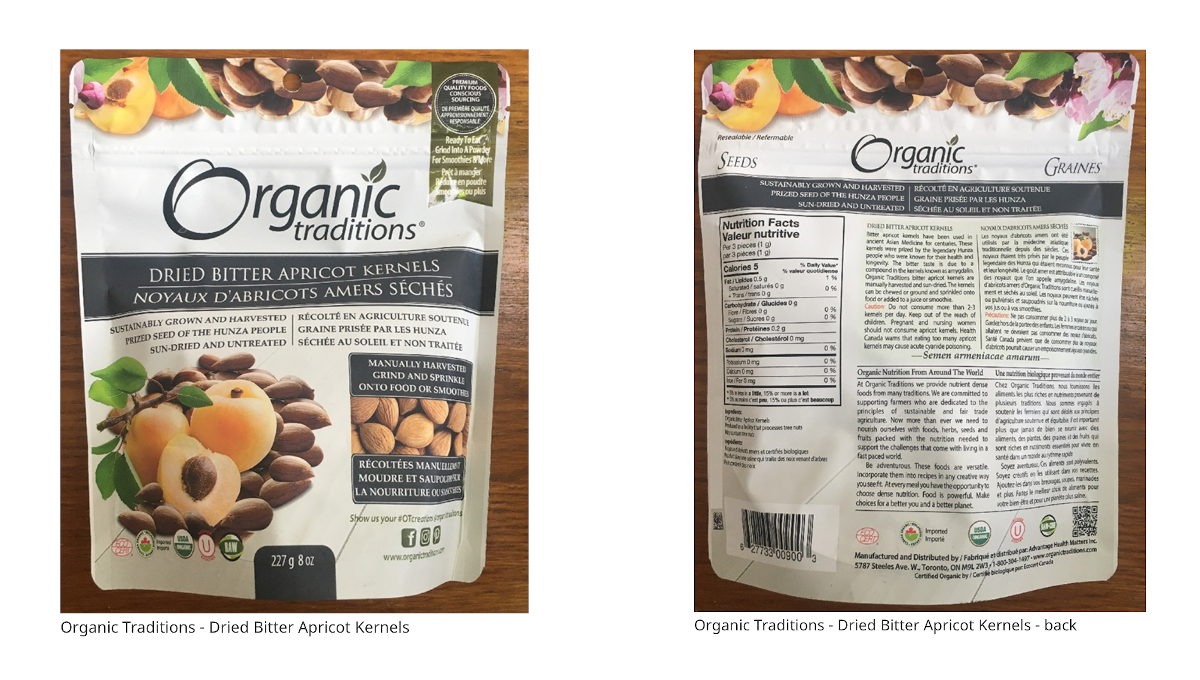Apricot kernels with excessive levels of toxin recalled; cyanide risk cited

Advantage Health Matters Inc. is recalling Organic Traditions brand dried bitter apricot kernels from retailers nationwide in Canada because of excessive levels of a natural toxin that can cause cyanide poisoning.
Some of the apricot pits do not expire until December this year, according to a recall notice posted by the Canadian Food Inspection Agency. Health officials are urging consumers to check their homes for the recalled product. No one should eat any of the implicated apricot kernels.
“Apricot kernels naturally contain amygdalin, which can release cyanide after being eaten. The human body can eliminate small amounts of cyanide, but larger amounts can result in cyanide poisoning, which could lead to death,” according to the notice.
Symptoms of cyanide poisoning include weakness and confusion, anxiety, restlessness, headache, nausea, difficulty breathing and shortness of breath, loss of consciousness, seizures and cardiac arrest.
Anyone who has consumed any of the recalled apricot pits and developed symptoms of cyanide poisoning should seek medical attention at once.
Recalled apricot kernels are:
| Brand | Product | Size | UPC | Codes |
|---|---|---|---|---|
| Organic Traditions | Dried Bitter Apricot Kernels | 227 g | 6 27733 00900 3 | LOT:AHM900190228D EXP:05/2020 LOT:AHM900190321D EXP:05/2020 LOT:AHM900190417D EXP:05/2020 LOT:L200421135 EXP:12/2021 |
On Jan. 25, 2020, Health Canada established a maximum level (ML) of 20 parts per million (ppm) total extractable cyanide in apricot kernels sold as food. This ML allows Canadians choosing to consume apricot kernels to do so in a similar fashion as other more common types of seeds and nuts sold in Canada, while protecting them from the risk of cyanide poisoning, according the national agency.
Apricot kernels used as an ingredient in other foods must also meet this ML. Apricot kernels that do not meet Health Canada’s ML will not be allowed to be sold in Canada.
According to European health officials, apricot kernels are safe to eat in processed products, like almond biscuits, as the baking process reduces levels of the toxin. They resemble small almonds and have an almond-like taste.
A 2016 European Food Safety Authority (EFSA) opinion found eating more than three small raw apricot kernels, or less than half of one large kernel, in a serving can exceed safe levels. Some sellers promote them as a cancer-fighting food and promote intake of 10 and 60 kernels per day for the general population and cancer patients, respectively.
According to European Commission Regulation No. 2017/1237, apricot kernels must not contain more than 20 milligrams per kilogram of hydrocyanic acid.
(To sign up for a free subscription to Food Safety News, click here.)
